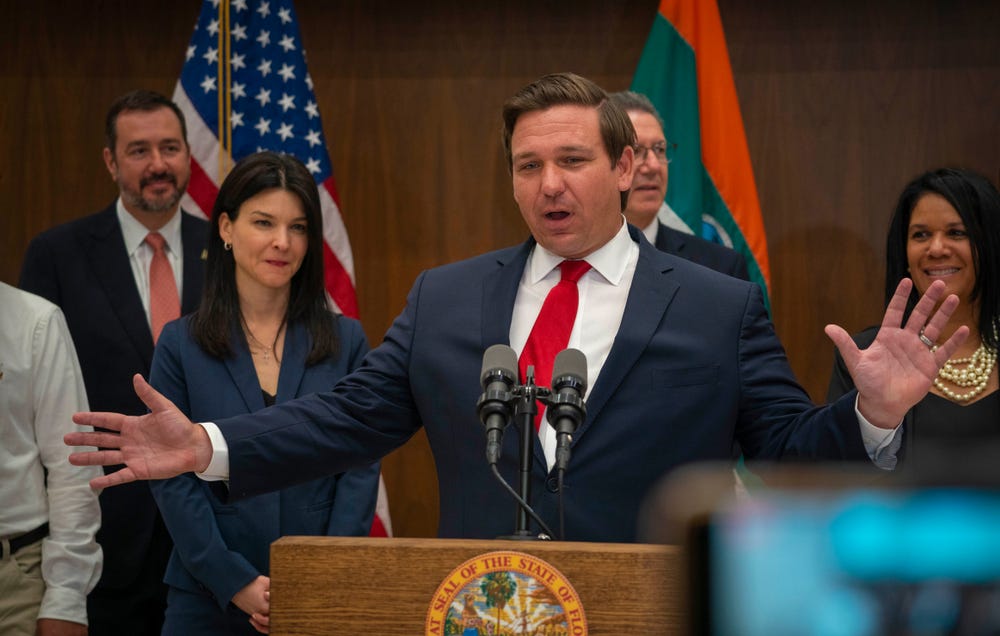E-Pluribus | August 22, 2022
The evolution of the Sexual Revolution, whence wokeness, and a federal judge acts to stop the Stop WOKE Act.
A round-up of the latest and best writing and musings on the rise of illiberalism in the public discourse:
Louise Perry: I'm 30. The Sexual Revolution Shackled My Generation.
Revolutions don’t always end up where the instigators envision. Louise Perry, who recently released her first book, The Case Against the Sexual Revolution, writes for Bari Weiss’s Common Sense that women (and men) were sold a bill of goods and that it turns out much of what has been rejected as outmoded and old fashioned regarding sex and relationships has value after all.
I’m not a religious conservative. I’m a feminist, and I’ve spent my entire professional life working on the issue of male violence against women—first in a rape crisis center, and later as a journalist and a media relations director for a legal campaign against sexual violence.
It’s precisely because I’m a feminist that I’ve changed my mind on sexual liberalism. It’s an ideology premised on the false belief that the physical and psychological differences between men and women are trivial, and that any restrictions placed on sexual behavior must therefore have been motivated by malice, stupidity or ignorance.
The problem is the differences aren’t trivial. Sexual asymmetry is profoundly important: One half of the population is smaller and weaker than the other half, making it much more vulnerable to violence. This half of the population also carries all of the risks associated with pregnancy. It is also much less interested in enjoying all of the delights now on offer in the post-sexual revolution era.
[ . . . ]
If we are to challenge the social costs of the sexual revolution effectively, then we can’t redesign society on the back of an envelope. We have to look at social structures that have already proven to be successful and compare them against one another, rather than against some imagined alternative that has never existed and is never likely to exist. The technology shock of the Pill led many liberals to the hubristic assumption that our society could be uniquely free from the oppression of sexual norms and function just fine.
The last 60 years have proved that assumption to be wrong. We need to re-erect the social guard rails that have been torn down. To do that, we have to start by stating the obvious: Sex must be taken seriously. Men and women are different. Some desires are bad. Consent is not enough. Violence is not love. Loveless sex is not empowering. People are not products. Marriage is good.
Read it all.
Theodore Kupfer: Where Did Wokeness Come From?
References to “wokeness” are everywhere these days, but where did wokeness come from? At City Journal, Theodore Kupfer reviews and critiques some of the proposed sources of the ideology that is impacting politics, culture, religion, relationships, and more.
Ideas have consequences. The idealist account sees wokeness as the offspring of long-gestating intellectual trends. The specifics might vary, but the broad story tends to be the same: influential thinkers developed a critique of reason, objectivity, and neutrality that conquered the ivory tower before infecting everyone from Democratic Party politicians to the editors of Teen Vogue. Whether it was Immanuel Kant, Theodor Adorno, or Jacques Derrida, some philosopher started the process by arguing that humans had insufficient grounds to believe things they once took for granted, since those beliefs were filtered—and distorted—by limited individual faculties, cultural biases, or “systems of power and hierarchies, which decide what can be known and how.” That critical posture toward established truths challenged the foundations of Enlightenment civilization and encouraged a vision of the world as divided among “oppressed classes” and an “oppressor class.”
[ . . . ]
Psychological accounts. Two explanations argue that wokeness has gained traction in response to specific changes in Americans’ psychology. One posits that wokeness resembles a religion, filling a spiritual vacuum in American life. Author John McWhorter argues that “third-wave antiracism . . . has actually become a religion,” complete with a clergy in the form of writers such as Ibram X. Kendi and Ta-Nehisi Coates, a creed holding that “racism is baked into the structure of society,” and a creation myth involving the African slave trade. Another sees it as a byproduct of the infantilization of young Americans by well-meaning but overprotective parents.
[ . . . ]
Incentives. Into this breach step two materialist explanations, alleging that woke politics in the corporate environment serves the incentives of economic actors. First is the “woke capital” thesis, which maintains that executives adopt a woke posture—moving operations out of red states, endorsing the outlandish rhetoric of diversity trainers—to make money. Maybe a company’s endorsement of the idea that the United States is founded on the plunder of black bodies enables it to attract more talent, as it’s hiring from a small pool of young people with top-notch educational credentials, whose worldview tends to be similarly woke. Maybe a company’s declaration of a solemn commitment to social responsibility allows it to exploit a growth field, as in the creation of ESG funds by financial firms. Or maybe executives are preempting a potential anti-capitalist upsurge from the political Left.
Read it all here.
Scott Shackford: Federal Judge Blocks Florida Law Banning 'Woke' Workplace Training
According to Florida governor Ron Desantis, the Individual Freedom Act is an attempt to keep the workplace from becoming a woke place and trampling on the rights of employees. His position, however, is far from universal, even among conservatives. Now a federal judge in Florida has hit pause on the Stop WOKE Act, calling it “naked viewpoint-based regulation on speech,” reports Scott Shackford for Reason.
On Thursday, Chief U.S. District Judge Mark E. Walker of the U.S. District Court of the Northern District of Florida, Tallahassee Division, spent 44 pages of a decision patiently explaining that using government force to ban discussions of issues DeSantis doesn't like is blatantly unconstitutional and ordered the state not to enforce the law.
The Individual Freedom Act (IFA) bans both schools and businesses from teaching or training students or employees a list of eight controversial ideas the law's proponents associate with critical race theory. They include controversial concepts like the belief that people of a certain race are inherently racist or sexist (consciously or unconsciously), that people of a certain race are responsible for the racist behavior of their ancestors, or that certain values (like belief in excellence, hard work, or fairness) are racist in origin or used to oppress other races.
We can debate whether these are good or bad ideas. What's not debatable is whether the state of Florida has the legal power to stop private employers from teaching these ideas. It does not, and by implementing the IFA, Walker notes that this part of the act "is a naked viewpoint-based regulation on speech that does not pass strict scrutiny" and cannot be enforced.
Read the whole thing.
Around Twitter
Twitter has suspended Colin Wright for… a cartoon:
Via the Foundation Against Intolerance & Racism (FAIR), Angel Eduardo asserts there’s actually a good way to foster Diversity, Equity, & Inclusion:
And finally, professional women’s golf faces the transgender question:













